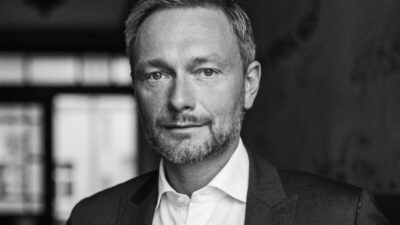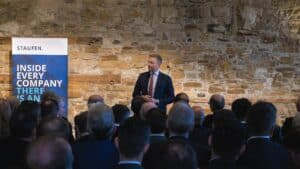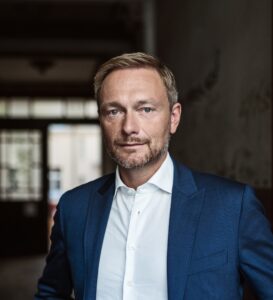
POLITICS & ECONOMY, March 25, 2019, Köngen Castle
When the Chairman of the FDP speaks to entrepreneurs in the liberal heartland of Baden-Württemberg, you could consider it a home game. For Christian Lindner, however, this was no reason to be less fierce than usual at the “Politics & Economics” Staufen event. On the contrary, the Chairman of the Free Democratic Group in the German Bundestag made it very clear that “a new growth agenda for Germany” will only work if the economy undergoes a major shift in thinking as well.
When Christian Lindner took the microphone on Monday evening after being welcomed by Staufen CEO Wilhelm Goschy, the “Schlosskapelle” (the castle chapel and also the largest hall in Köngen Castle) was filled to capacity. Not only around 100 owners, board members and managing directors from German industry had accepted the invitation of Staufen AG, but also Dieter Althaus, former CDU Prime Minister of Thuringia, Lindner’s party colleague Helmut Haussmann, Federal Minister of Economy in Kohl’s Cabinet from 1988 to 1991, as well FDP Members of Parliament Ralph Bombis and Michael Theurer, Member of the Bundestag and Regional Chairman of the FDP in Baden-Wuerttemberg.
“Things will never again be as stable as they are today,” warned FDP Leader Lindner right at the beginning of his lecture, which was divided into five thematic blocks. He, therefore, considers it irresponsible how the Grand Coalition distributes financial gifts (mothers’ pension, government grants to support families building homes, etc.) while others risks (Brexit, China, etc.) are on the rise. According to Lindner, this “budgetary imbalance” implies that legislators are losing the opportunity to shape it. Because of this, he calls for a moratorium on new expenditures. Germany is on course to wear out and is at the same time also the “world champion in taxes and duties,” said Lindner.
In addition to the loss of financial opportunities, bureaucracy is the greatest threat to prosperity, says Lindner. As examples he mentions German’s implementation of the General Data Protection Regulation (GDPR) as well as the Federal Ministry of Labor’s current plans to enact a legal claim to part-time work from home. “And even Minister of Economy Altmaier’s industrial strategy has been drawn up by bureaucrats,” criticized the FDP leader.
With his proposal to modernize education federalism, Lindner was met with some sharp disagreement by the audience. The fear of many participants: making agreements based on the lowest common denominator instead of establishing a German Republic of Education. “Baden-Wuerttemberg is not competing with Lower Saxony but Germany is with China and the United States,” says the FDP politician to his critics. “This task is for society as a whole.”
And he also called for rethinking with regard to the shortage of skilled workers. Lindner advocated for immigration policy based on a point system, like in Canada, to specifically bring the required workforce from abroad to Germany. However, this will only work if these qualified and motivated people are then accepted by society and especially by the economy. “Clearly, we still have a tolerance problem if people continue to not be invited to job interviews because of their name or ethnicity, or they have fewer chances to pursue a career and then earn less,” says Lindner calling on top managers.
The fifth and final point on the FDP Chairman’s growth agenda was digitization. Lindner compared this to an ice hockey match: “Germany has overslept both the first – on the topic of hardware – and second period – on the topic B2C platforms. But there is still hope for the final period – Industry 4.0 and B2B platforms.” All in all, the approach towards digitalization has been too hesitant. Moreover, the country itself has no digital agenda. Digitization of registration for start-ups in North Rhine-Westphalia demonstrates how things could be improved. Potential savings according to Lindner: 500,000 working hours per year.
In his conclusion, Lindner emphasized that he rejects the political concept of inciting fear in people. Especially since the items he described also required courage. Finally, the FDP Leader was asked what message he would campaign with in the next election in order to turn this agenda into a government program. Lindner’s answer: “Modernize the business model Germany!”
OUR GUEST
Christian Lindner (born January 7, 1979) is a member of the German Bundestag and Chairman of the Free Democratic Group in the German Bundestag. In December 2013, Christian Lindner was elected Federal Chairman of the Free Democrats. In the federal election of September 2017, he regained the FDP seats in the German Bundestag after four years in the extra-parliamentary opposition. Christian Lindner has been a member of the FDP since 1995. In 2000, he was elected a Member of Parliament for the first time in the North Rhine-Westphalian State Parliament. From 2012 to 2017 he was Chairman of the FDP State Parliamentary Group in NRW. Originally from Wermelskirchen, he studied political science, public law and philosophy at the Rheinische Friedrich-Wilhelms-Universität Bonn. From 1997 to 2004, Lindner was owner of an advertising agency and co-founder of an Internet company.
OUR TOPIC
The world is changing and with it the local conditions for our economy. In times of disruptive change, bold course decisions are needed to secure our prosperity for the future. The dynamism unleashed in politics, markets and technologies must be countered with determination and courage. Germany must once again become an active force of change. Christian Lindner speaks of a new agenda that Germany needs in order to generate prosperity in the future.


